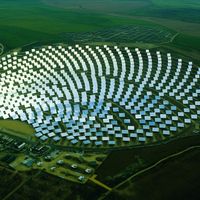 One of the most misunderstood crisis periods in American history came at the turn of the last century.
One of the most misunderstood crisis periods in American history came at the turn of the last century.
What later historians called the Progressive Era was driven by a desire for normalized input prices — human rights and rising wages were just a byproduct.
It was clear as early as the 1880s that giving monopolists the power to set "free market" prices for crucial inputs like rail service would not allow for the creation of giant factories needed to make America globally competitive. Thus Wall Street, and Washington, put together giant holding companies, concentrating power in safe hands.
Without stable prices for inputs like transport and electricity, entrepreneurs like Henry Ford could not have built things like the River Rouge plant. Stability is why Ford gave his workers the "unheard of" wage of $5/day for factory work.
Countries like China and India, which watched America dominate the last century while their great old civilizations stagnated, have taken this lesson to heart. Thus India can set a goal of 20 gigawatts of grid-connected solar power by 2022, and stick to it. China is doing the same thing, but promising that if costs come down it will do even more.
I find it amusing when capitalist ideologues in this country call such plans "socialist." Was J.P. Morgan (above) a socialist? Grover Cleveland? Was John D. Rockefeller when he calmly putted out upon hearing his Standard Oil monopoly would be broken up and said "buy Standard?"
 Fact is, maximizing our alternative energy output takes planning. Short term prices can be manipulated. They can fall in the near term, and if you let an auction market determine your economic path you are asking for trouble.
Fact is, maximizing our alternative energy output takes planning. Short term prices can be manipulated. They can fall in the near term, and if you let an auction market determine your economic path you are asking for trouble.
It takes long term planning, and long term finance, to put a gigawatt of wind power into Long Island Sound. Basing 20-year plans on short term auction prices is what got us into the housing bubble. Loans have to be matched to the maturity of the investment they're made for.
I suspect the contrarians are right and alternative energy companies are headed for a good year in 2011. But the lesson from this should be clear. Long term planning and stable input prices are not socialist.
What alternative energy needs from government, any government, are stable policies on which it can base long term plans. And American entrepreneurs need the toughness to tell this government that if we don't get those policies here, business will go elsewhere.










Solar energy is the best alternative to reduce scarcity problem of resources.
Solar energy is the best alternative to reduce scarcity problem of resources.
And again Dana uses wrong logic. There is no solar race. India and China don’t have oil Dana, that’s why they make these heavily inefficient investments.
Enough said.
And again Dana uses wrong logic. There is no solar race. India and China don’t have oil Dana, that’s why they make these heavily inefficient investments.
Enough said.
I agree with what Dana said that to maximize our alternative energy, it needs planning. A thorough planning. I have this Solar Hot Water System at home, and I’m looking forward of extending my “go-green” plan to other systems or ways as well.
I agree with what Dana said that to maximize our alternative energy, it needs planning. A thorough planning. I have this Solar Hot Water System at home, and I’m looking forward of extending my “go-green” plan to other systems or ways as well.
Good for you Dana (oops – Lana). Keep the economy turning!
Good for you Dana (oops – Lana). Keep the economy turning!
especially if its used in residences. Residential solar energy is the best method/way to cut cost and save the planet.
especially if its used in residences. Residential solar energy is the best method/way to cut cost and save the planet.
Yeah you need some thoughts on what kind of approaches you’ll use and what equipments that you will purchase. me ive read an article about Solar Heating Systems and i’m planning on installing one myself not just for the monetary benefits but also the long term advantages on our eco system as well.
Yeah you need some thoughts on what kind of approaches you’ll use and what equipments that you will purchase. me ive read an article about Solar Heating Systems and i’m planning on installing one myself not just for the monetary benefits but also the long term advantages on our eco system as well.